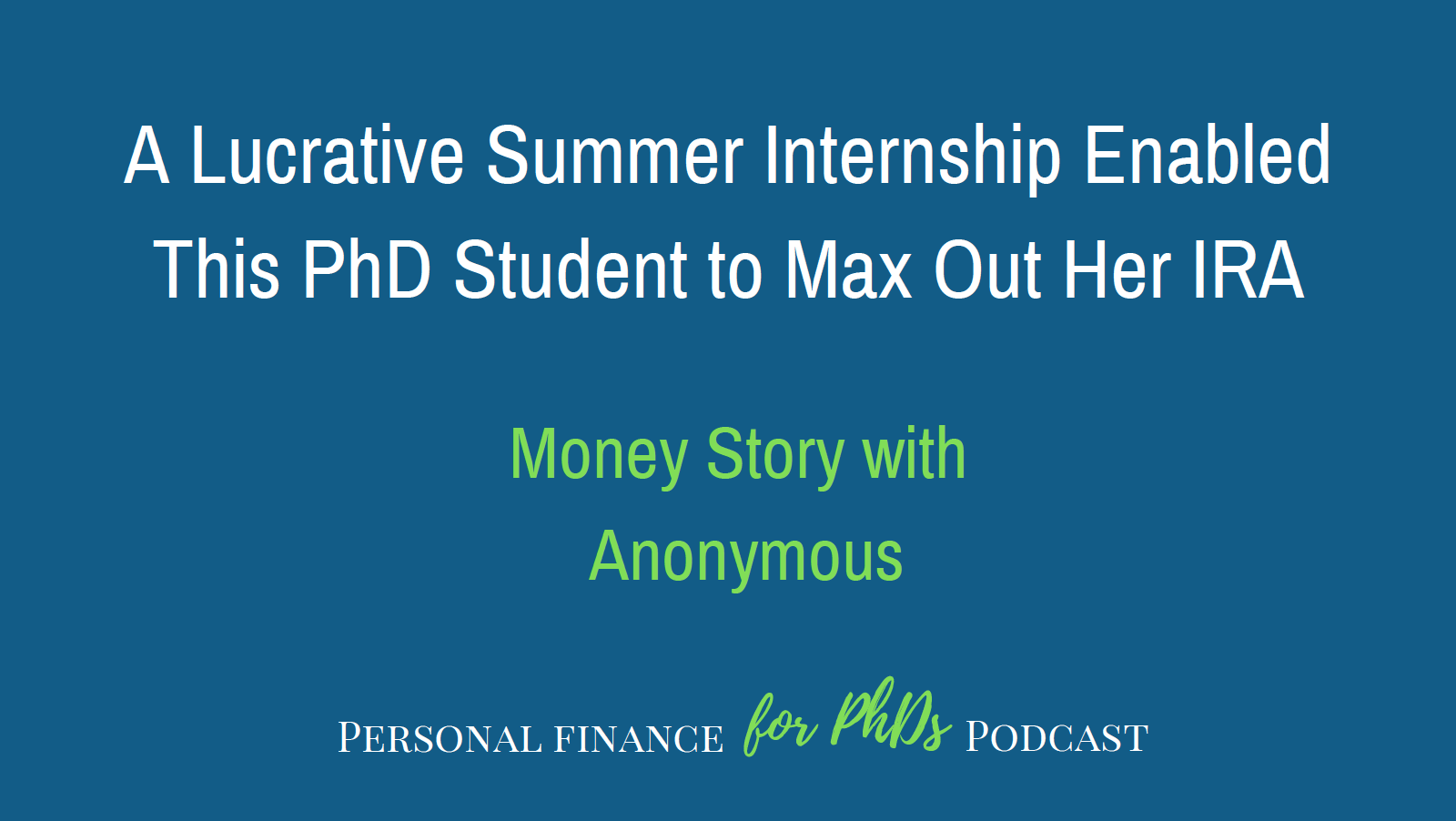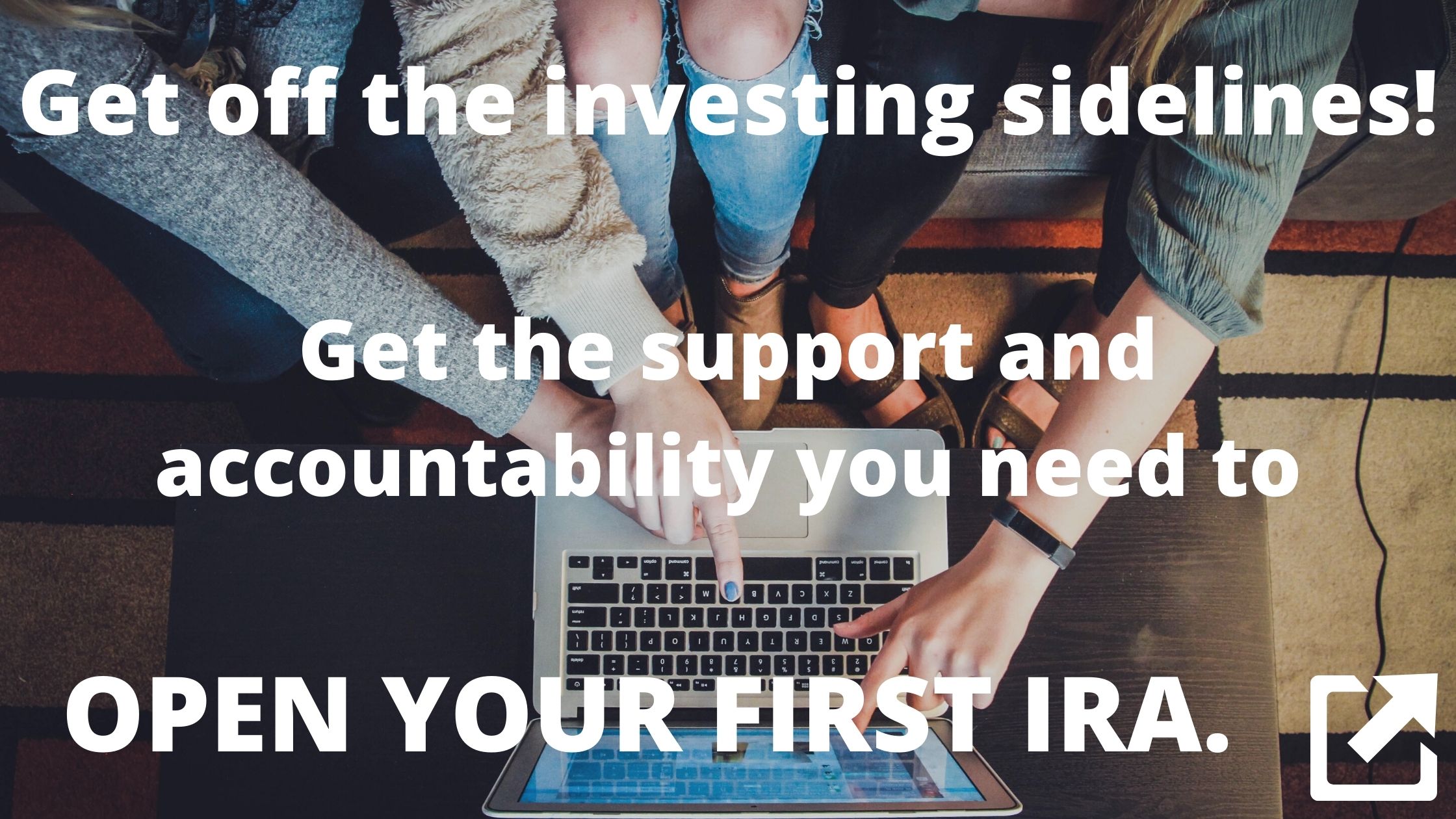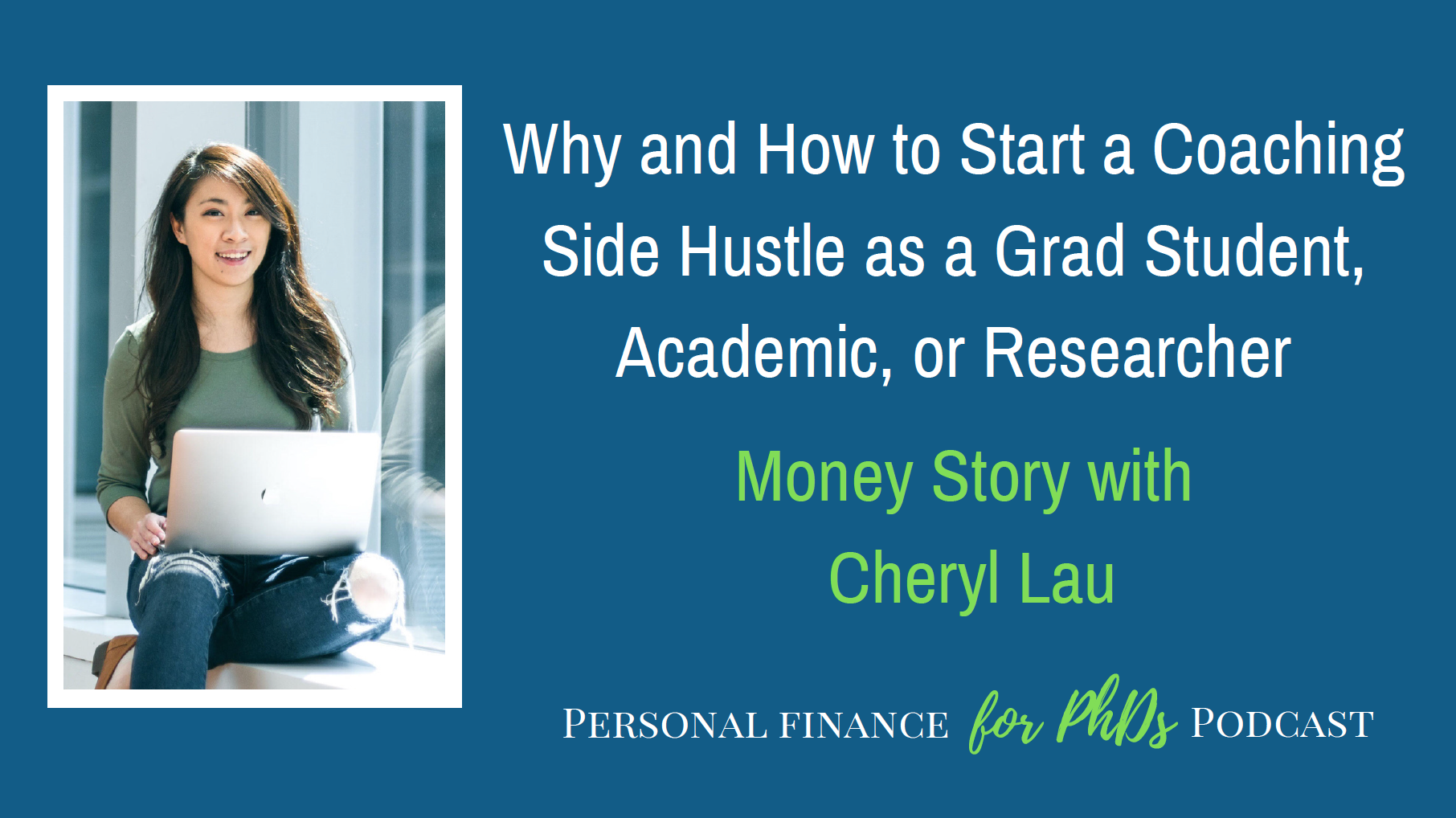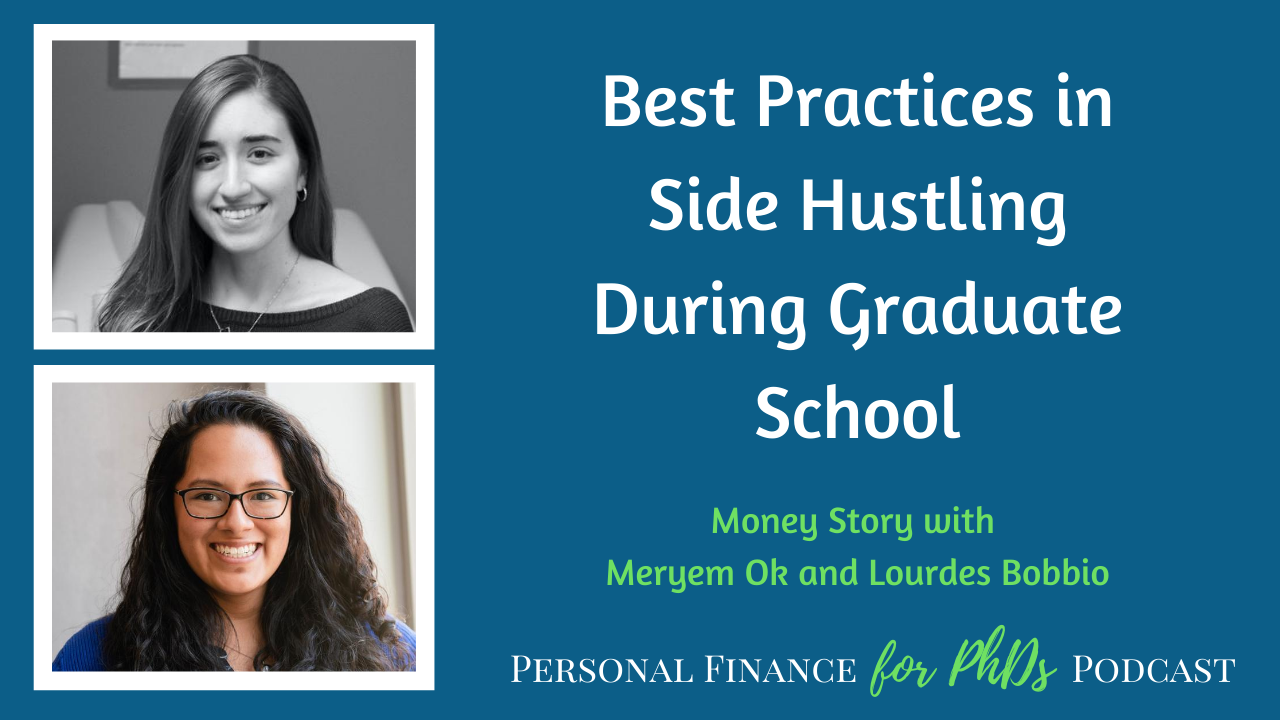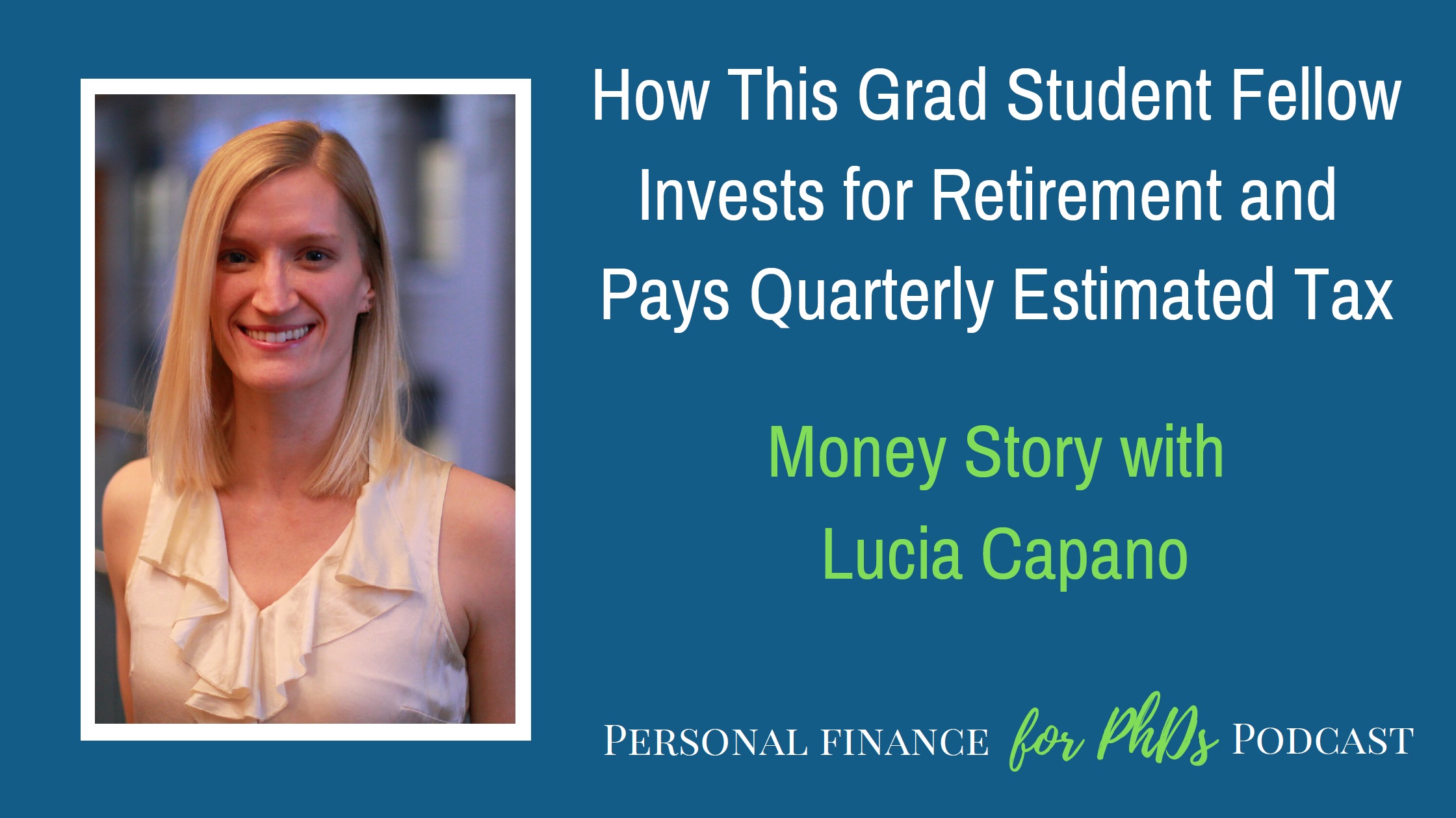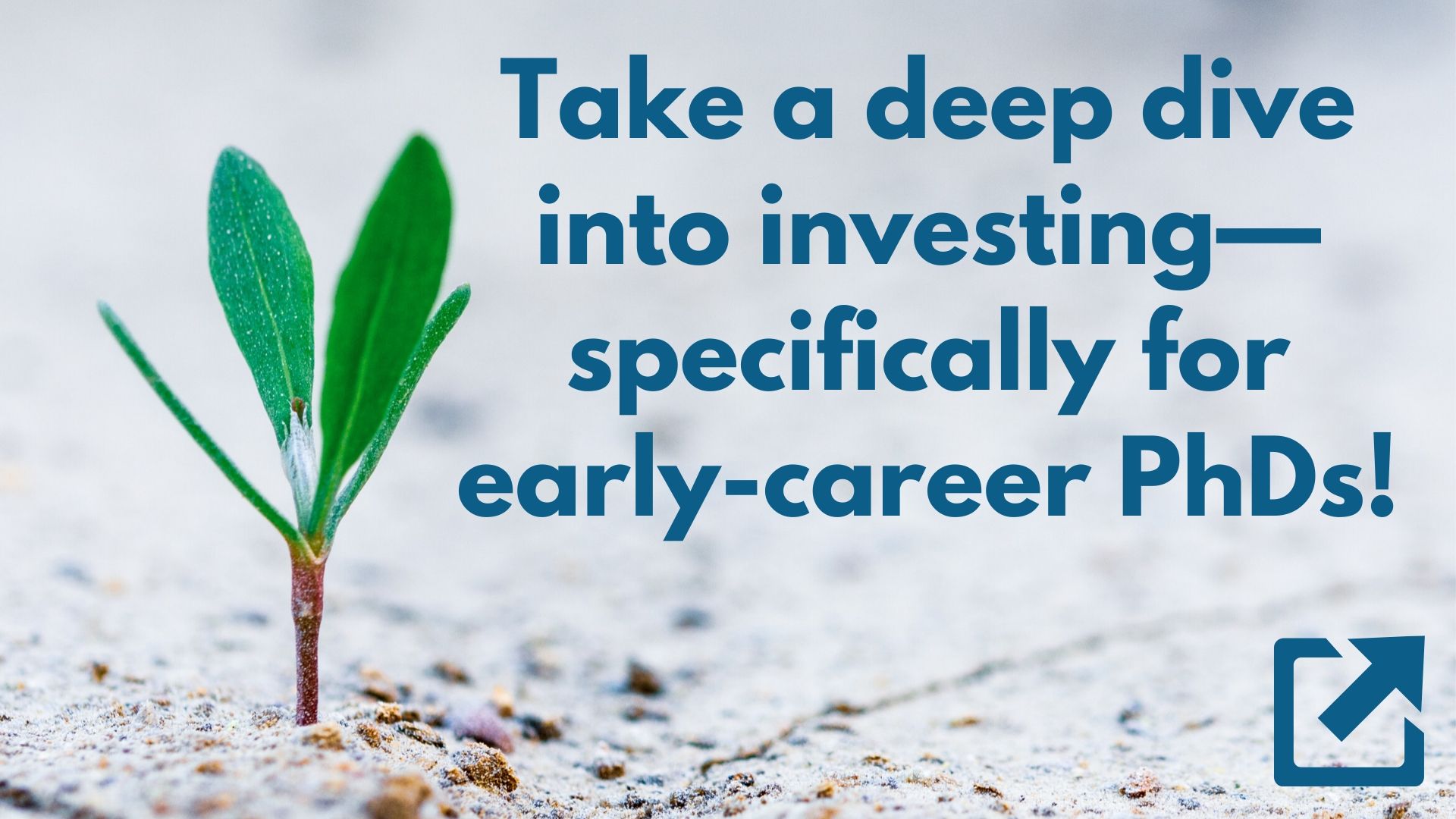In this episode, Emily presents five stories from anonymous guests of successful stipend negotiations between prospective or current graduate students and their PhD programs. The episode is primarily for prospective grad students going through admission season right now and secondarily for current graduate students. Emily summarizes her key take-away points from these stories and her conversations with graduate students about this issue over the past few years. The goal of this episode is to convince you that stipend negotiation does happen, at least on occasion, and perhaps even to give it a shot yourself to improve not only your own bottom line but potentially that of your peers as well. Most of all, Emily wants this episode to get PhD students talking about their pay—how much, when, from whom, in exchange for what. To that end, please share this episode and enter your stipend into PhDStipends.com.
Links Mentioned in this Episode
- PhDStipends.com
- Related Episodes
- The Academic Society: Grad School Prep
- Personal Finance for PhDs: Community
- Personal Finance for PhDs: Podcast Hub
- Personal Finance for PhDs: Subscribe to the mailing list
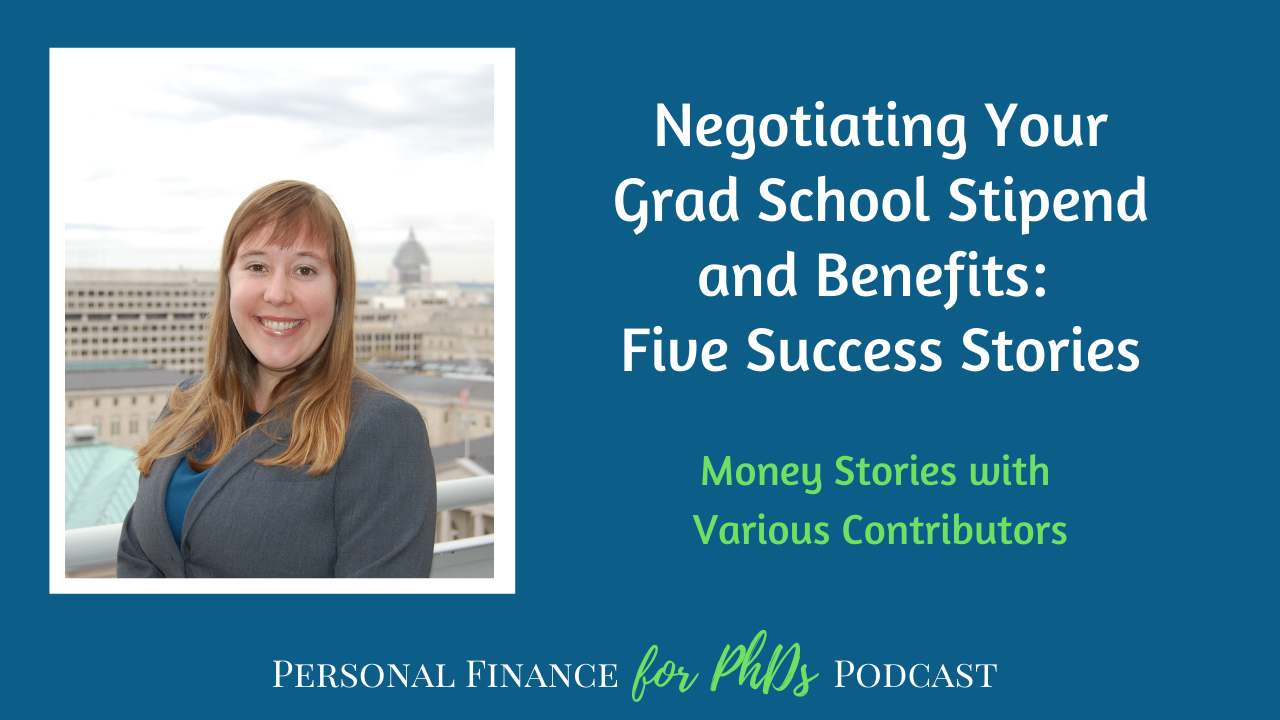
Teaser
00:00 Guest 1: Overall, I would say that there’s definitely no harm in asking and negotiating a graduate school offer. If I didn’t ask the answer would have automatically been no. And at first, I was scared to ask and really only did because my advisor, whom I admire, encouraged me to do so, but now that I did, I am very grateful and definitely realized the benefits of asking nicely for a better graduate package.
Introduction
00:28 Emily: Welcome to the Personal Finance for PhDs podcast, a higher education in personal finance. I’m your host, Dr. Emily Roberts. This is season eight, episode seven, and I’m joined today by several anonymous guests. This is a compilation episode, all about negotiating your grad student stipend. It’s primarily for prospective graduate students going through admission season right now, and secondarily for current graduate students. I have collected five stories of successful stipend negotiations between prospective or current graduate students and their PhD programs. I’ll also share my observations from talking with graduate students about this issue over the past few years. My goal is to convince you that stipend negotiation does happen, at least on occasion, and perhaps even to give it a shot yourself to improve not only your own bottom line, but potentially that of your peers as well. Most of all, I want this episode to get PhD students talking about their pay — how much when, from whom, in exchange for what?
01:33 Emily: There are two specific action steps that I’d like you to take to further the cause of pay transparency and increasing stipends for everyone, whether you are a prospective, current, or former PhD student. One, share this episode. I hope it will serve as a conversation starter. Two, enter your stipend into PhDStipends.com. I recently gave the website and database a facelift, so you’ll find an updated and more detailed survey along with the over 9,000 previously acquired entries. After you enter your stipend, share that site too. I’ve been contacted by numerous graduate students and faculty members who have used the data to advocate for higher graduate student stipends in their departments.
02:16 Emily: This is such a thrilling time of year for prospective PhD students. I know most of us want graduate school to be better for the PhDs that come behind us than it was for us. I hope the negotiation, examples and best practices that you hear in this episode contribute in a small way to that goal.
02:34 Emily: Now it’s time for the book giveaway contest. In February, 2021 I’m giving away one copy of the simple path to wealth by JL Collins, which is the Personal Finance for PhDs Community book club selection for April, 2021. Everyone who enters the contest during February will have a chance to win a copy of this book. If you would like to enter the giveaway contest, please rate and review this podcast on Apple podcasts, take a screenshot of your review and email it to me [email protected]. I’ll choose a winner at the end of February, from all the entries you can find full instructions pfforphds.com/podcast.
03:15 Emily: The podcast received a review this week titled a masterclass in personal finance for grad students. The review reads quote: “I tell everyone I know about this podcast. Every episode is not only packed with value from others, lived experiences, but also actionable info from Dr. Emily Roberts. My favorite eps are always about side hustling and house hacking”
03:36 Emily: Thank you so much to BKT for this incredible review! I’m really glad to know which subjects are the most relevant for listeners. Without further ado, here’s the compilation episode on negotiating your grad student stipend.
03:53 Emily: I have five anonymous stories for you today regarding negotiating a grad student stipend and/or benefits. I solicited these stories from my mailing list and on Twitter, and they all occurred in 2019 or 2020. I wanted to keep the examples of recent, but just know that several more people volunteered their negotiation stories from earlier years.
04:14 Emily: By the way, I don’t get a lot of pushback on Twitter when I talk about financial matters, which I’m happy about, but soliciting these negotiation stories was another matter. Multiple people responded that they believed it was impossible to negotiate a grad student funding package or that it was unethical to do so because it would create pay disparities among a cohort, as if that didn’t already exist. Anyway, I thought it was interesting that the subject seemed to get some people’s hackles up, even though salary and benefit negotiation is an expected step prior to accepting any other type of job. That is just confirmation for me, that this topic warrants even more sunlight.
04:53 Emily: I’ve covered or touched on negotiation and academia, both at the grad student stage and leader in multiple previous podcast episodes, which you can find links to in the show notes. My intentions with publishing this episode are to: one, bring awareness to the fact that negotiation is at least theoretically possible for graduate students, particularly during admission season. This could be considered part of the hidden curriculum. I want to bring it into the open so that all graduate students benefit from this knowledge. Two, share the stories of grad students who have negotiated successfully, wo that prospective graduate students in 2021 in later years can learn from their examples. Three, raise grad student stipends and improve benefits, generally, not just for the occasional individual.
05:41 Emily: One way to do this is by collective action, such as unionization, which I’ve covered in several other podcast episodes. Another is for prospective PhD students to say to the people who hold the purse strings that livable or dare I say comfortable funding packages are important to them as people and vital to their academic and career success in graduate school. Prospective, graduate students have relatively more power than current graduate students to get this message across.
06:11 Emily: Okay, I’ll get off my soapbox now and play for you the five stories I received. Four of these negotiations occurred during admission season, before the person formerly committed to the PhD program in question. One of the negotiations occurred after the person was already enrolled in a program. So don’t think that negotiation is out of the question just because you are past the admissions stage.
Guest One
06:37 Guest 1: Hello. I want to thank Emily Roberts for having me on this podcast. I’m going to be talking about how I successfully negotiated my graduate student stipend offer. For some background information on me, I recently graduated from my undergrad and I did a double major in psychology and biology. And this last year I applied to graduate school for a PhD in neuroscience. When I heard back from all of the schools that I interviewed at, I was accepted into a few different programs and I managed to narrow down my decision to two programs that I really, really liked. Since I really liked both of these programs, I was really stuck at that point, and I was kind of struggling on which one to decide where I would attend graduate school.
07:39 Guest 1: However, there were a few differences between these two schools. One of them was offering me an additional scholarship on top of the stipend and the other one wasn’t. I was actually leaning more towards the one that was not offering me the scholarship. So I thought that I could even just get a little more money from them then that would completely solidify my decision to attend that school. I figured if one of the schools was offering me more money than other programs like the other one, I was debating between probably do the same thing. I was lucky enough to know someone else that also interviewed at the school that I was deciding on and they told me that they were offered an additional $2,500 for the first year. So I was like, okay, I know the school could provide me at least $2,500 more. So I talked to one of my advisors and I told her the entire story and she encouraged me to negotiate for more money. She is a very powerful woman in the STEM field and I look up to her tremendously, so I trusted her and wanted to follow her.
08:56 Guest 1: After that, I wrote a very kind email to the program coordinator asking if there was any possible way that the school could provide me additional support as it would aid in my decision to ultimately attend that school. My email to her included that, I told her I was very seriously considering accepting the offer to attend that school because I really enjoyed the program, the campus, the location was incredible, and it perfectly aligned with my criteria in selecting a graduate school. However, I told her that while I’m excited for the opportunity to attend the school, another school who I’m also considering for graduate school is offering me an additional scholarship on top of the stipend to attend their program, so I was wondering if there was any possible way that this program could offer me any additional support to attend. I told her if, so I’m certain I will choose the school to complete my graduate studies. And of course, I thanked her for her time and her consideration. After I sent that kind email, the program corner coordinator replied back and told me that they could offer me the $2,500. Obviously after that, I was very thankful to them and I decided to attend their program.
10:16 Guest 1: I would like to note that this $2,500 still did not match the scholarship that the other school was offering me. They were offering me about $17,000 spread out over three years. So although the offer made to me by the other school was not nearly as much, I figured that if they were willing to at least give me no whatever they had, and that I was leaning more towards that program anyway, that I would do well there and that I was thankful to them for giving me additional support.
11:01 Guest 1: Overall I would say that there’s definitely no harm in asking and negotiating a graduate school offer. If I didn’t ask the answer would have automatically been no. At first I was scared to ask and really only did because my advisor who I admire encouraged me to do so, but now that I did, I am very grateful and definitely realize the benefits of asking nicely for a better graduate package. I hope all of that helps anyone that is trying to negotiate their student offers and know that it is possible. Thank you, Emily again for having me. Bye.
Guest Two
11:41 Guest 2: Thanks for covering this topic of negotiation. And I’m excited to be telling you a bit about my experience with this. This past season, the admission season starting in 2019, I applied to PhD programs mainly in biological and biomedical sciences with a couple of neuroscience programs mixed in there as well, and I ended up getting a decent number of offers. I think I had five acceptances by the end, which was great.
12:10 Guest 2: I was mainly deciding between two schools. So there was one on the East coast and one on the West coast. The East coast school was a very well-respected and highly ranked program. They had a lot of really great research that I was interested in, and they also had a pretty decent stipend. It was about $34,000 for I’d say a moderate cost of living area. It wasn’t low cost of living, but you could certainly live very comfortably with that stipend in that local area. That was also with, you know, health insurance covered and tuition and fees all paid for all that good stuff.
12:46 Guest 2: The thing I didn’t like about the East coast school was the location. I really didn’t like the city all that much. It also wasn’t the best area for having a good job market for my husband. I wasn’t against it, but I was still kind of shopping around and then the other school, which was actually the last program that I interviewed at, was on the West coast and this program basically checked off all my boxes for me. It had great research, it had a pretty strong reputation and I loved the city. I loved the weather. I liked the vibe of it. It really strong job market for my husband’s field. The only downside was the cost of living. This school actually had the exact same stipend as the East coast schools, about $34,000 with the same benefits and tuition coverage and all that, but it was quite a bit more expensive. And so the quality of life you could have on that stipend would just end up being a little bit lower. You would have to budget a little more carefully. And in particular, the main difference was housing. Housing in that area, if we wanted my husband and I to get like a one bedroom apartment, especially one that was fairly close to campus, it would have been at least $2,000 a month, which would be pretty hard to swing on a $34,000 stipend. And I didn’t want to count on my husband’s income just because we hadn’t moved there yet, we didn’t know how long it was going to take him to get a job and all that. That made me a little bit nervous.
14:13 Guest 2: What I did is I went to the West coast school after I was accepted and I basically laid out everything I told you — that I really liked their program. It was exactly what I was looking for in graduate school. The only issue was that the cost of living made it really hard to live there, and I mentioned that I had this other offer that checked off all the other boxes, other than location. As I went in, I knew vaguely that they had some kind of a priority housing system. At the school, the way graduate housing normally exists, they have subsidized graduate student housing, but you can only live in it for up to two years. And I had heard vague rumors without much detail that there was some way that they would allow you to live there for your entire PhD, not just two years. And the subsidized housing is literally about half the cost of what would normally be. You can get a one bedroom for about a thousand dollars a month. So I just asked them directly, can you nominate me for whatever program that is? And if you do, I will commit to the school immediately. I sent this to the admissions coordinator basically. He emailed me back. He said, I have to check with some people and I have to confirm how many spots they have for this program. So I said, sure. And then a week later they emailed me back and said, Hey, we’re nominating you for this program, congratulations, and I accepted right away.
15:31 Guest 2: I’m really happy with how this negotiation turned out. I think it’s going to make our living situation much more comfortable with not having to pay basically twice as much for our housing. And also not having to stress about like moving and trying to find an apartment before I moved to that city because I don’t live in the area currently. I think it all worked out really well and I would definitely encourage other students to try to negotiate their PhD offers as well, and especially be open to not just negotiating the base stipend, but also those other benefits. Hope this is helpful for other people who are in the same situation.
Guest Three
16:05 Guest 3: Hi. I am currently a first year PhD student in neuroscience at an R01 university and when I was trying to decide which program to attend, I did negotiate my offer a little bit. I’m not sure if I would super consider it a negotiation, but basically what I did do was I had several offers, and one of them was financially a lot more attractive than the other, as well as being from a very fancy name school. Not that the school I ended up with wasn’t a great university, but the other one I had an offer from that was financially a little bit better was one of the top three universities for my area of study. What I did was I emailed the program director and said that a few days before the deadline was to decide and basically phrased it as I know this is a bit of an awkward question, but I was wondering if the graduate fellowship package, which was about $31,500 a year for six years, was something that was potentially negotiable.
17:13 Guest 3: I basically told them that I was accepted to another program, mentioned the name of the university and mentioned that it was a special fellowship offer for underrepresented minority applicants, because I did fit into that category and that because it was such a difference, it made it hard to ignore this other factor that because I was more excited about the university I ended up at, that I was wondering if there was anything they could do to make the offer a little bit better, if there was any possibility for getting additional fellowship because I know the university does give out a few, or if there’s any wiggle room, another area of the offer.
17:53 Guest 3: My email was very casual and very sincere. I was a little bit overly apologetic, I think, but considering my request, I thought that was appropriate. I let him know that if there’s any more information I could provide them with that I could definitely do that. I think for me, what was important was like something that I think certain people wouldn’t mention is that I did fit into this underrepresented minority category in case that was something that might increase my eligibility for certain offers. I did get a reply from the professor that was the director of graduates studies for this program saying that all the offers are out and they weren’t able to negotiate an increase in actual stipend, but they would include an additional incentive called some sort of award. I’m not going mention the name, that they discussed with the director of the institute. It would be $1,500 a year for the first three years of graduate study to be used on educational or training expenses, such as like a new laptop, travel, anything like that, that would help me in the early stages of my graduate career. And that would compound for the first three years. So I can use it for pretty much anything that could potentially contribute to my education.
19:15 Guest 3: This was something that they were adding, in addition. I realized that they couldn’t actually add something to my offer, but this was something that was possible to add on top. It obviously isn’t that big of a difference, but it was something that showed me they did care a little bit more and just made my decision a little bit easier. It did end up, well for me. They also mentioned that they were considering offering it to me, before I emailed them, that’s why I mentioned, I’m not sure how much of a negotiation this truly was, but it seemed to me that it’s pretty common for universities to be able to offer additional money that’s not technically considered part of a stipend, like something like educational costs because a stipend seems like a pretty unchangeable type of offer.
20:07 Guest 3: So that was my situation. The process was easy for me. My decision was easy after that. My phrasing was in my email was very sincere and apologetic. I think it was also important that I mentioned that I really did want to accept an offer from the university I ended up at and that the main thing was that with such a financial difference, it was something I had to consider. So if you are planning on sending an email to someone, I would make sure that they know that you do want to accept their offer. That it’s only financial aspects that are making you hesitate. I wouldn’t ask if you aren’t sure about accepting an offer for that university. Thank you.
Commercial
21:00 Emily: Emily here for a brief interlude. This announcement is for prospective and first year graduate students. My colleague, Dr. Toyin Alli of The Academic Society offers a fantastic course just for you called Grad School Prep. The course teaches you Toyin’s four step Grad Boss method, which is to uncover grad school secrets, transform your mindset, up-level your productivity, and master time management. I contributed a very comprehensive webinar to the course titled “Set yourself up for financial success in graduate school”. It explores the financial norms of grad school and the financial secrets of grad school. I also give you a plan for what to focus on in your finances each season of the year that you apply to and into your first year of grad school. If this all sounds great to you, please register theacademicsociety.com/Emily for Toyin’s free masterclass on what to expect in your first semester of grad school and the three big mistakes that keep grad students stuck in a cycle of anxiety, overwhelm, and procrastination. You’ll also learn more about how to join grad school prep, if you’d like to go a step further again, that’s theacademicsociety.com/Emily for my affiliate link for the course. Now back to our interview.
Guest Four
22:28 Guest 4: I am an international student from a lower middle income country, and I’m studying at a large public flagship university in the US located in a college town that’s within a significant metro area. I’m in a social sciences PhD program and my department is ranked quite highly, I think in the top 10. Here, there are different funding sources, but the most basic and common that’s guaranteed for everyone comes from the department itself. It pays $20,000 over nine months with no annual increase. Starting in 2020 first year, students get $5,000 for the first summer, but otherwise there is no guaranteed summer funding.
23:10 Guest 4: The stipend is service-based, which means students receiving this must work as TAs for every semester for about 12 hours a week. That’s what’s written on our contract, but in reality, it fluctuates quite a bit. This funding package means that the department covers your tuition, all your fees, like printing, student health, recreation, or fitness, et cetera, and also covers your health insurance, including for your dependents. There’s no other deductions except for taxes. Living wage here is $26,000. So that $20,000 we get is below the living wage. And if you can believe it, many other social sciences departments here have even smaller stipends. But the reality is if you’re single and can budget, well, you can survive. You can live quite decently with the $20,000, but it is below the living wage and there’s no way around it.
24:04 Guest 4: As for negotiating, I wasn’t even aware that you could do it, at first. I did my undergrad outside of the US so I had no idea about funding models here. And also, I guess I just didn’t have the cultural capital, so to say, to know about this process, but luckily at the first open house that I went to, another visiting student told me about it and gave me pointers. He told me to say something during the one-on-one meetings with some professors along the lines of an important factor about going to graduate school includes financial considerations for me, making sure I can live decently while studying, without having to worry about being able to pay for emergencies, blah, blah, blah.
24:50 Guest 4: At that point I prepared my spiel before I started my one-on-one meetings. I was really torn between two universities, both paid the same, same living cost as well, so I didn’t really have full leverage, but both paid below living wage, so that was my first argument. My second argument that I prepared was about the extra constraints I had as an international student, financially speaking. And my third argument was that I received a traineeship from a research center in both universities, which was great. It had certain requirements and usually pay extra, but I found out then that I wasn’t eligible for the funding because of my international student status. I brought up this last point towards the end of the meeting as a way to steer the conversation towards the topic of money. I subtly hinted that I was quite surprised by that and then I just shot straight and brought up my other two arguments. I ended up getting a very validating response, but also as you expect diplomatic. It’s like, we’ll see what we can do, we’ll get back to you. Later that day, I heard other visiting students talking to the director of graduate studies about this, about negotiating during social events or downtimes, so I decided to do the same thing, of course.
26:11 Guest 4: A week after the visits, I emailed the director of graduate studies, again, in both places, just echoing the same points and offering to provide any extra information if they need anything. But that email was mostly just a guise to make sure that this was still on their radar. About a week before the deadline, one school told me that they don’t have news yet it’s still pending. But by then, the other school had promised me an extra $6,000 for the first to work as a research assistant paid for by the professor’s research funds and an award that gave me an extra $5,000 from the research center, so I ended up going with this school. That is when I learned that different professors have different pots of money, of different sizes, sometimes very considerably different. And if you talk to upper year students, they’re likely to be very open about this.
27:09 Guest 4: A few other lessons that I learned from this process, if you have concerns about money, you can be transparent and open about it. You can talk to other visiting students or upper year students because it’s likely on their minds too, or it has been in the past and the conversations may yield interesting insights. If you want to do it, do it. And when you’re talking about money, of course, you need to be polite, and if you’re uncomfortable, I learned that saying something explicit about your discomfort can help the conversation go better. Like, “Oh, I don’t love talking about money,” something like that.
27:48 Guest 4: When you’re doing the ask itself, maybe keep it vague because the prof already usually know what you mean and they know how the department stipend compares to similarly ranked programs, so you don’t have to be too pushy or give a concrete number or anything. I personally think that talking about money with them and reason to your professors should not be a turn off, especially because you will have to talk to them again about money once you’re in the program, and again, when you go into the job market and you’re negotiating or learning what the salaries are like. I think this is good training for you and for me, and part of the hidden curriculum of academia that people talk about. Also, I think expecting your profs to be validating of your concerns when you explain it to them is a very important thing, especially when you’re going to work with them for the next four to six years. In a way this negotiation process can be a method for you to gauge whether or not that professor can be that validating kind of support system for you once you’re in the program. And the worst that can happen is that you realize that they’re not that person and that might be a deal breaker, or that might not be.
29:05 Guest 4: I also realized that international students can be somewhat in a double bind. We are more financially vulnerable, but also we’re not always aware of the system here. Again, this is the hidden curriculum and cultural capital problem. We don’t know that the system here in the US is maybe more flexible than in other countries when it comes to giving accommodations for people. And also we might not be culturally comfortable or adept at negotiating in the American way and advocating for ourselves. I think talking with other international students about this is really important as I learned when I was going through the open house visits as well.
29:49 Guest 4: And lastly, I think the negotiation does not and should not end after you’ve accepted your offer. Negotiation is actually not always an equitable solution to what is ultimately not really an individual problem. It might actually lead to more unequal outcomes when one student is able to get more out of their negotiations than others, just because they have that privileged background to know how to negotiate well and all of these things. I think some ways to address this is to ask upper year students about what advocacy efforts are happening in the department to support graduate students in general, or maybe support international students specifically, if that’s your demographic, especially early in their careers, when they’re more vulnerable and have less resources. To give you kind of an example of the power of advocacy, in our department, we managed to get a promise from our department to fund summers for all first year students after, you know, working with the department to make sure that they know that this is a concern that was important for us students.
Guest Five
30:59 Guest 5: Thank you, Dr. Roberts, for having me on this episode of your podcast. I would say you are doing the Lord’s work. Importantly, this work of yours is sure to prepare one or two howto ask for what they already deserve. Here’s my story in fall 2018 I got an offer, actually two offeres from two universities in the US that I applied to, to come study insect science. Both offers were juicy, or so I thought since I was living in a third world country at a time. Interestingly, I went with the least offer, which was about $5,000 less than the next offer. And by offer, I’m talking about the annual stipend which was $17,000 at a time. So money was never the motivation for me.
31:51 Guest 5: One year in, in the PhD program and I was about $2,200 in credit card debts. Besides my health insurance was so basic that it couldn’t cover for my high insurance. I had to live miserly to be able to get my glasses and whatnot. This began to bother me a lot. This is because I live very simply. I do not eat out. I always cook from home and if I cannot eat in the morning, I bring food along with me to the school. I do not use any fancy gadgets. In fact, 80% of the things that I own were donated to me by graduate students or churches, or I brother was kind enough to lend a brother a helping hand.
32:39 Guest 5: Importantly, I was in debt because my annual stipend was below my standards of living. For emphasis sake, my average monthly expenses, my rent was $595. I pay on average $75 on electricity bill per month. The university bill, which is about $1600 every semester. Now keep in mind, this bill covers the health insurance, international students fee, or what have you. So that means to be able to pay for the $1,600 bill, which is every semester I had to save about three $20 from my monthly stipend. My phone bill is $55 and I pay $65 on my car insurance. I spend about $300 on food. Now, if you had add all of these figures together, you get $1,410. And my monthly take home pay was $1,416.67. And this is the figure before tax. In other words, I get just about $6.67 cents above what my monthly bill is. Again, this figure $1416.67 cents is what I get before tax. Now, if you make the federal tax deduction and the state deduction from my fee, you get way less. I know my federal tax is about $200, but I do not know what the state tax is right now. I’ll probably need to check my pay stub to be able to know what the figure is, but the federal tax is about $200.
34:26 Guest 5: Now, given I’m an international student, I was super nervous about asking for a rise. I went to meet other grad students and post docs whose opinion I value very much on how to navigate this murky water. They all said the same thing: I should never ask for a raise as it might come back to haunt me. So I wasn’t just scared, I was terrified to ask for a raise. But on a certain day, I was reading the book “Self-reliance” by Ralph Emerson in which I saw the quote “Who so would be a man, must be a nonconformist.” And I was all pumped.
35:08 Guest 5: The next day I got to school and I approached one of my advisors. I was more comfortable approaching my male advisor because the atmosphere around him is much more relaxing. I explained how I struggled to meet up with my daily needs, given my monthly stipend. As I anticipated, he was so kind and I listened attentively. He reassured me that I had done the right thing and appreciated me for speaking up because he said he would never have known that I was struggling to make a living had I not approach him. What he did after that was even more amazing. He called me on my way out of his office and he said, “we never had this discussion.” So that way, nothing comes back to me. Later I got an email notifying me of an increase in my annual stipend by $2,500. What is even more interesting is that after six months I got another email notify me of another $2,500 increase in my annual stipend, bringing my current stipends to $25,000, as we speak. And that is my story on how I approached and asked for a raise from my advisors. Thank you.
Key Takeaways
36:34 Emily: Thank you very, very much to the five people who contributed these stories and the others who volunteered. Here are my key takeaways from these stories. One, only negotiate with a program if you are seriously considered enrolling in it. I agree with the approach in these stories of narrowing down to a couple final programs and negotiating with just your top choice or two. Don’t waste, everyone’s time by negotiating with a program that you aren’t seriously considering.
37:01 Emily: Two, there are many different levers that programs can pull to improve your financial situation. The examples we heard in these stories are giving a supplemental scholarship for professional development, giving a general supplemental award, guaranteeing a spot in subsidized housing, increasing an annual stipend and increasing a summer stipend. I’m sure that the constellation of options is unique to each program, which is why your request should be rather general.
37:30 Emily: Three, if you already know who your advisor would be, go ask that person for direction. They may be able to negotiate on your behalf or point you to a next step to do on your own. They are the person most invested in having you complete graduate school successfully. If you don’t yet have an advisor assigned, you’ll likely negotiate with the director of graduate studies or similar.
37:53 Emily: Four, during your negotiation conversation, you should be very polite and express gratitude for the offer of admission, acknowledge that you’re bringing up an awkward subject and express the specific reasons that you want to join their program.
38:07 Emily: Five, while I don’t think you must have a specific reason to be asking for more in your funding package, it doesn’t hurt to have one. Leverage can be in the form of a competing offer, a comparison to the local living wage or personal data regarding the cost of living. I’ve spoken with other graduate students who negotiated after winning outside funding.
38:28 Emily: Six, several of the students in these stories mentioned that of course money was a factor in their decision, but it wasn’t the end all be all. A program being willing to negotiate shows that they are supportive of you. Even if your attempt at negotiation is unsuccessful, there is a world of difference between a program that listens to you, acknowledges your concerns, and cast around for additional opportunities on your behalf, and one that dismisses you out of hand.
38:55 Emily: Seven, several of these students said they only knew that negotiation was possible because other students had tipped them off. I encourage you to talk about the subject openly with your peers and older students. You can use this episode or PhDStipends.com as a conversation starter. You may learn of a financial resource that you can tap. However, as in our last story, don’t be discouraged by people who tell you not to negotiate, if they never tried it themselves. The absence of successful negotiation stories in your circle is not proof that successful negotiations cannot occur.
39:31 Emily: Speaking of unsuccessful negotiations, I did not solicit these kinds of stories, but I have heard a few. Don’t take it personally, if your negotiation is unsuccessful. Like I said earlier, programs have different levers they can pull and some might be super limited. However, if you were attempting to negotiate out of financial need, you should really think about whether you can afford to get your PhD from a program that is unable or unwilling to sufficiently support you financially. Financial stress will curtail your ability to perform academically as well as magnify the financial opportunity cost of getting a PhD.
40:10 Emily: Here are your action steps after listening through this episode. For prospective graduate students: consider negotiating one or two of the offers you have received or will receive this spring. This signals to PhD programs that finance has matter, and that it is a field upon which they can compete for students. For current graduate students: don’t count yourself out on the negotiation front. If you want to be paid more approach your advisor, like the person in our last story did. They should be able to brainstorm with you about methods for accomplishing that and even advocate on your behalf. Speak with your peers and prospective grad students openly about your income and even encourage them to negotiate. The worst case scenario is that nothing changes for you. And the best case scenario is that the department realizes the stipend is an issue and raises it for everyone. For everyone: please share this episode with prospective and current graduate students and enter your current or former stipend and stipend offers into PhDStipends.com. If you can’t already tell, I really want to bring more attention to this issue and sharing this episode will go a long way, so thank you in advance for doing so. If you are a prospective grad student who wants a private space, where we can have more of this type of conversation and even access a training video on how to decipher your offer letters, visit PFforPhDs.com/decipher and join the Personal Finance for PhDs Community.
Listener Q&A: Investing Savings Rate
Question
41:37 Emily: Now onto the listener question and answer segment today’s question actually comes from a survey I sent out in advance of one of my university webinars this past fall, so it is anonymous. Here’s the question: “What percent of income should be used for investment?”
Answer
41:54 Emily: If you’ve been consuming personal finance material for a little while, you’ve probably already heard a few different benchmark answers this question, at least with respect to investing for the goal of retirement. One benchmark that I heard a lot, pre-financial crisis was 10%. 10% of your gross income toward your retirement accounts. If you are a Dave Ramsey follower, he tells you 15%. If you are a FIRE Walker and want to retire early 50% is a common benchmark in that community.
42:29 Emily: So you can see these benchmarks are kind of all over the map, although certainly above zero. Now, since this question comes from a graduate student, I want to emphasize that it is not appropriate, or possible, or necessary for all graduate students to be saving for retirement from their grad student stipends. Some graduate students are simply paid way too little for investing for retirement to even be a possibility. For those of you who were closely following that negotiation conversation from earlier in the podcast, this is something that you should take into consideration when you are planning your negotiation:will you be able to save for retirement from your grad student stipend? So if you have more pressing financial needs than investing for retirement, the answer to this question might be 0%.
43:20 Emily: Now, for those of you who are able and inclined to save for retirement, I will refer back to the financial framework that I talked about in the last episode. In my financial framework, which I developed specifically for our grad students and early career PhDs, investing for retirement comes at step four. So assuming you’ve taken care of steps one through three, and you’re on step four, my answer depends on your age. If you are starting to invest for retirement in your twenties, my answer is 10%, for the moment. If you’re starting in your thirties, my answer is 15%. If you are starting in your forties or later, my answer is 20%. This is a percentage of gross income, by the way, pre-tax income.
44:03 Emily: Now, when you first arrive at step four, it’s not a given that you will have that 10 or 15 or 20% of your income available for retirement investing. So step four is your process of increasing your income and, or decreasing your expenses to the point that you can get to that benchmark. After that you move on to steps five through eight while maintaining that retirement savings percentage in step seven of my framework, we come back around to investing and that’s where I encourage everyone who was saving at 10% from step four, to increase to 15% at a minimum. The logic here is just that most people, most of the time, saving 15% of their income will allow you to retire at approximately what your pre-retirement salary was at age 65 or so. It’s perfectly okay if that savings rate seems lofty to you right now. It’s something that you can work up to over time and of course you have a better shot at achieving it post-graduate school.
45:03 Emily: For my own personal choices in this matter, when I started graduate school, my goal was to save 10% of my gross income toward retirement. I gradually increased that over the course of graduate school so by the time I finished, I was saving about 17% of my gross income into retirement accounts. Fairly shortly after that, my husband and I increased that rate to 20% and it has stayed there for approximately the last five years, as we have been saving for a house down payment. I’m really happy with that savings rate for us right now. After the house purchase, the retirement savings rate might have to come down a bit so we can actually make our mortgage payment, but I’m hoping over the long term to increase it above that 20% benchmark as we do pursue early-ish financial independence.
45:52 Emily: So that’s my answer. And there’s a few different stages, a few different nuances to it, but I hope it gives the listener some clarity. It’s okay if you aren’t able to save anything, especially during graduate school. It’s a really financially difficult time of life, but if you can get to that 10%, 15%, 20% figure you’ll be doing really well. And above that, the question is simply how soon do you want to become financially independent? The higher savings rate, the sooner that date arrives. If you would like to submit a question to be answered in a future episode, please go to PFforPhDs.com/podcast and follow the instructions you find there. I love answering questions, so please submit yours!
Outtro
46:35 Emily: Listeners, thank you for joining me for this episode. PFforPhDs.com/podcast is the hub for the Personal Finance for PhDs podcast. On that page are links to all the episodes show notes, which include full transcripts and videos of the interviews. There is also a form to volunteer to be interviewed on the podcast and instructions for entering the book giveaway contest, and submitting a question for the Q&A segment. I’d love for you to check it out and get more involved. If you’ve been enjoying the podcast, here are four ways you can help it grow. One, subscribe to the podcast and rate and review it on Apple podcasts, Stitcher, or whatever platform you use. If you leave a review, be sure to send it to me. Two, share an episode you found particularly valuable on social media, with an email list serve, or as a link from your website. Three, recommend me as a speaker to your university or association. My seminars cover the personal finance topics PhDs are most interested in, like investing, debt, repayment and taxes. Four, subscribe to my mailing list at pfforphds.com/subscribe through that list. You’ll keep up with all the new content and special opportunities for Personal Finance for PhDs. See you in the next episode! And remember, you don’t have to have a PhD to succeed with personal finance, but it helps. Music is Stages of Awakening by Poddington Bear from the Free Music Archive and is shared under CC by NC podcast, editing and show notes creation by Lourdes Bobbio.
